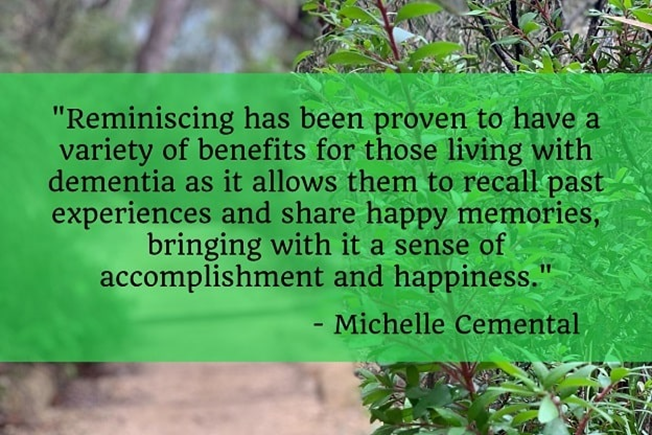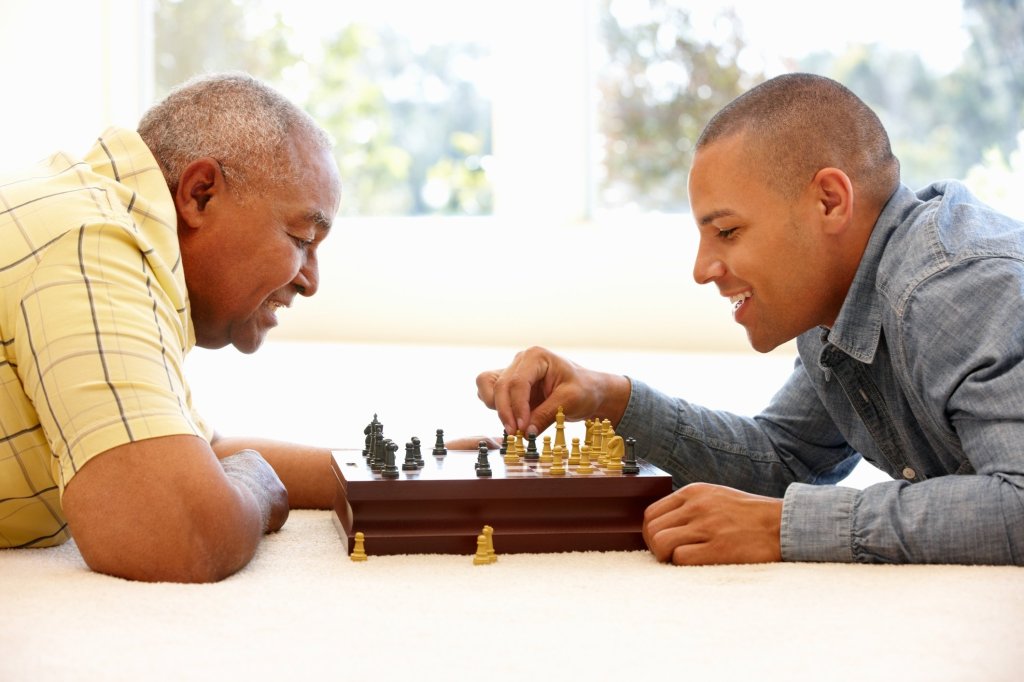
Helpful Daily Activities for Dementia Patients: 50 Expert Tips and Suggestions to Keep Your Loved One Engaged
Staying active and engaged is beneficial for both physical and cognitive health, so it’s particularly important for people with dementia or Alzheimer’s disease to engage in daily activities. Some activities have proven to be particularly helpful for those with dementia, such as games, exercise and outdoor activities, and music and art, as well as maintaining day-to-day routines. Providing structure and routine for a person living with dementia helps to maintain their cognitive function, sense of security, and can calm anxious or aggressive behaviors. It also helps provide a sense of control over their day and their environment, especially for those in the early stages of the disease. For those in the end stage of dementia, many of these activities are often one of the few ways they can still engage their memories and communicate.
To help you keep your loved one busy and actively engaged in meaningful activities, here are 50 tips from caregivers, memory care facility administrators, dementia and Alzheimer’s experts, and others who have experience in working with those living with dementia. Keep in mind that everyone enjoys different activities, and you should try the activities that best fit your loved one’s personality, needs, and situation. These 50 helpful daily activities are not listed in order of importance, but they are categorized to help you quickly find the activities best suited for your loved one.
Why Is It Important to Keep Dementia Patients Engaged in Daily Activities?
A daily routine with healthy activities is important for seniors of any age and especially vital for dementia patients. As dementia worsens over time, the person will find it more difficult to focus and struggle to learn new things. Having a routine in place early on helps give them structure that they find familiar. Additional benefits of having a routine that incorporates engaging activities for a loved one with dementia include:
- Stimulates Cognitive Function. Staying busy helps keep the mind fresh and ready to engage in new experiences. Therefore, it is important to stay active physically and mentally to the extent that the patient is able. Staying active with loved ones and friends also helps to maintain social bonds while challenging the person to recall memories and share ideas.
- Provides a Source of Focus. Daily activities also give a person with dementia something to focus on and look forward to. Friends and family can provide an excellent source of structure with planned activities to spend quality time with their loved one. Adding stability to the life of a patient with dementia through a daily routine is an effective way to reduce stress.
- Builds a Feeling of Productivity. Many elderly patients with dementia feel like they place a burden on their friends and family. Daily activities can help them feel more productive and feel that they are accomplishing something, however small, every day. Keep in mind that you should reduce or eliminate activities that your loved one finds too challenging to prevent frustration. It’s always best to create an environment with positive energy.
How to Choose the Most Appropriate Activities for a Loved One with Dementia
Selecting activities for a loved one with dementia is a very personal choice and should be based on your care recipient’s interests and abilities. With so many excellent ideas in this post and other sources, most caregivers will find a few activities that are meaningful and enjoyable for their loved one. When selecting your activities, here are a few things to keep in mind.
- Choose the Right Time for Each Activity. When starting an activity with a loved one, make sure that they are not particularly anxious or preoccupied with other things. If the time is not right for an activity, it’s usually best to postpone it and switch gears to a less-stressful activity. When the time is right, choose a clutter-free area to avoid distractions. It may also be helpful to plan activities based on the time of day. For example, you can choose gentle and relaxing activities like listening to music in the evening hours before bed.
- Adapt Activities to Match Abilities. It’s a good idea to check with your loved one’s healthcare providers to ensure that a new activity or exercise is safe for your loved one. Also, start small and give the person time to make progress, which will make the effort more rewarding. Activities that involve creativity like art are especially useful, as you will have something to display and enjoy after finishing.
Games
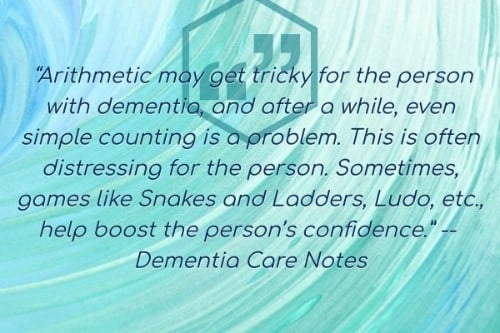
- Try a board game. “Arithmetic may get tricky for the person with dementia, and after a while, even simple counting is a problem. This is often distressing for the person. Sometimes, games like Snakes and Ladders, Ludo, etc., help boost the person’s confidence.” — Helping with Activities of Daily Living, Dementia Care Notes; Twitter: @dementiaDCN
- Test your trivia knowledge. “A study published by Dr. Robert Wilson and a team at Rush University Medical Center tracked almost 1,100 people with an average age of 80, for nearly five years, and found that playing trivia games and other forms of board games helped stave off mental decline by promoting activity changes in the temporal and hippocampus regions of the brain. These are the areas where working memory functions, which means that playing trivia games can be an easy way to stave off the symptoms of dementia.” — Dana Hinders, Trivia Games for the Elderly, Love to Know; Twitter: @lovetoknow
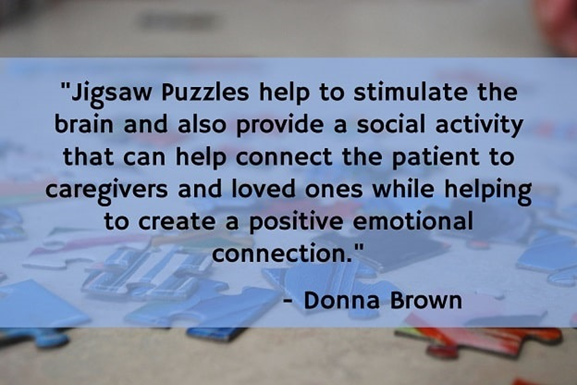
- Do a puzzle together. “Jigsaw Puzzles help to stimulate the brain and also provide a social activity that can help connect the patient to caregivers and loved ones while helping to create a positive emotional connection. Many dementia patients lose interest in activities easily and jigsaw puzzles can help stabilize this decline.” — Donna Brown, Are Puzzles Good For Dementia Patients?, The Missing Piece; Twitter: @thepuzzlequeen
- Complete the crossword. “When most people ask if crosswords are good for brain health, they’re most likely wondering if crosswords help strengthen memory. As this study found, solving crossword puzzles later in life delayed memory decline by 2.5 years in those who had developed dementia. Previous education of the participants was not a factor in the results.” — Kristen Seikaly, The 5 Main Health Benefits of Crossword Puzzles, Crossword Hobbyist; Twitter: @XWordHobbyist

- Try some improvisation. “Improv is all about being in the moment, which for someone with memory loss, that is a very safe place. Maybe thinking about the past and trying to remember makes the person a little anxious or even a bit sad because their memory is failing. And maybe thinking about the future too much is also anxiety-provoking. So being in the moment is such a safe and a good place to be.” — Mary O’Hara as quoted in Improv For Alzheimer’s: ‘A Sense Of Accomplishment‘, NPR; Twitter: @NPR
- Look for brain-training computer games. “Now a study of 2,800 people over the age of 65 has found that those who did a type of brain-training intended to boost a person’s brain processing speed were 29 per cent less likely to develop dementia over a ten-year period.” — Mallory Locklear, Brain training game linked to lower dementia risk a decade later, New Scientist; Twitter: @newscientist
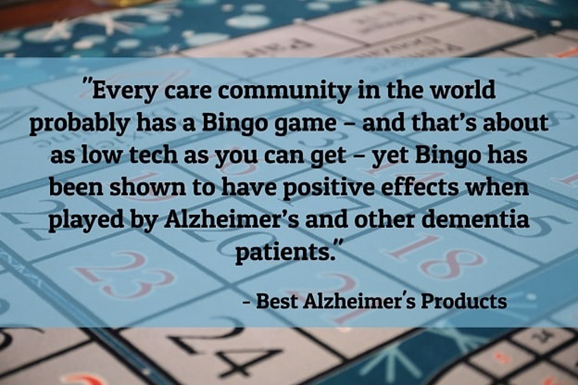
- Give Bingo a try. “Games for people with Alzheimer’s can be low-tech, high-tech, or anything in between. Every care community in the world probably has a Bingo game – and that’s about as low tech as you can get – yet Bingo has been shown to have positive effects when played by Alzheimer’s and other dementia patients.” — Let’s Play Bingo, Best Alzheimer’s Products; Twitter: @AlzProducts
- Pretend to be a handyman. “It can be difficult finding the perfect tinker toy for the senior in your life. We recommend getting something familiar to their lifestyle so they can make a real connection and get the most stimulation possible from their fiddle toys. You can hide things in different compartments within this box to make it a challenging adult puzzle, or simply use it as a toy to fiddle with in order to keep the senses engaged.” — Activity Lock Box for Seniors, The Alzheimer’s Store; Twitter: @alzstore
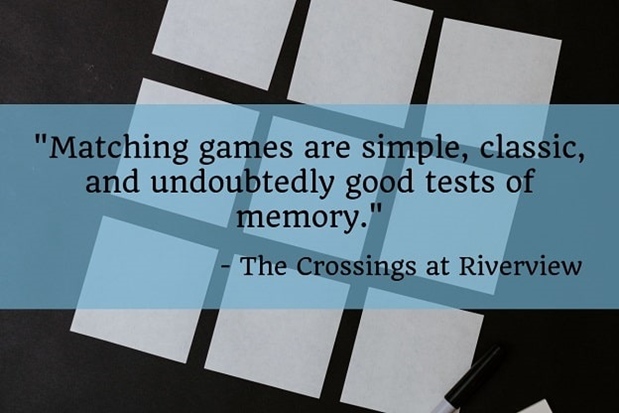
- Play a card matching game. “Matching games are simple, classic, and undoubtedly good tests of memory. Whether physical or digital, they typically involve a set of cards that are flipped downward (with the backside facing up) so they all look the same. Then, the player flips over two cards at a time, trying to find the cards that match.” — Memory Games For Seniors With Dementia, The Crossings at Riverview
- Tell a joke. “Laughing doesn’t just lighten your load mentally, it actually induces physical changes in your body. Laughter has been clinically proven to strengthen your immune system, activate and relieve your stress response and stimulate many organs.” — 10 Activities To Make Seniors Laugh, Golden Carers; Twitter: @GoldenCarers
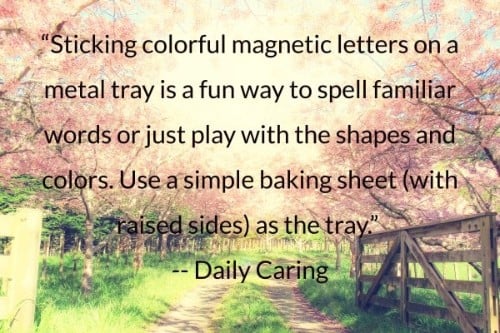
- Create a spelling tray. “Sticking colorful magnetic letters on a metal tray is a fun way to spell familiar words or just play with the shapes and colors. Use a simple baking sheet (with raised sides) as the tray.” — 10 Easy Crafts For Seniors With Dementia: Inexpensive DIY Ideas, Daily Caring; Twitter: @DailyCaring
- Play with a doll. “Senior care providers and experts say the dolls are an alternative to medication and help draw in elderly people who are no longer able to participate in many activities.” — Anna Gorman, The dementia therapy that can be cradled in your arms, Kaiser Health News via CNN; Twitter: @KHNews
Exercise and Outdoor Activities
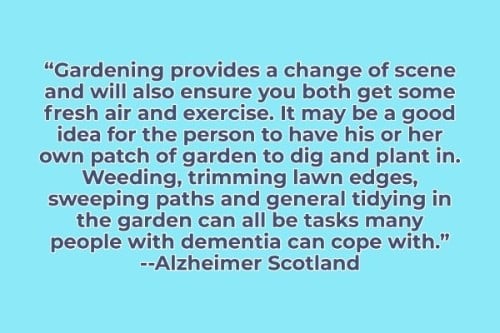
- Dig in the garden. “Gardening provides a change of scene and will also ensure you both get some fresh air and exercise. It may be a good idea for the person to have his or her own patch of garden to dig and plant in. Weeding, trimming lawn edges, sweeping paths and general tidying in the garden can all be tasks many people with dementia can cope with.” — Activities: A guide for carers of people with dementia, Alzheimer Scotland; Twitter: @alzscot
- Give chair exercises a try. “Face the person and have stimulating music playing with an easy to follow rhythm. You may wish to use music from their era, but it is acceptable to use any kind of music that elicits a positive response. Please remember their preference when selecting music. Design a routine that is repetitive and easy to follow. You may wish to start with 20 minutes and build up to 45 minutes as tolerated. Take lots of breaks. Hand held props held develop hand strength and provides a stimulating visual to follow the leader.” — Activity Ideas for Alzheimer’s/Dementia Residents; National Council of Certified Dementia Practitioners; Twitter: @NCCDP

- Take a dip in the pool. “The other remarkable thing about swimming is that for many people it is associated with happy childhood memories. So swimming can have a very positive affect on an individual’s mood. This often lasts longer than just the swim.” — Elaine McNish as quoted in Positive impacts of swimming for people living with dementia, Swim England; Twitter: @Swim_England
- Give Tai Chi a try. “The Mayo Clinic reports that up to 70 percent of people with Alzheimer’s also have symptoms of depression. They may eventually withdraw from all activities because, over time, they lose the ability to take part in the activities they once enjoyed. Exercise, such as tai chi, might help reduce depression in patients able to do the exercise and may alleviate boredom or loneliness.” — Jason Schneider, Graceful Exercise: Tai Chi, Fisher Center for Alzheimer’s Research Foundation; Twitter: @fishercenter

- Try a cardio-based activity. “A cardio workout is the most beneficial. Anything that can increase oxygen and blood flow to the brain.” — Amelia Schafer as quoted in Physical Exercise, Homewatch CareGivers; Twitter: @hwcaregivers
- Ride a bike. “A tandem bicycle allows you to sit up front and control the bike, while your passenger sits in the back seat and pedals. If the person with dementia has problems with their balance, you could try hiring a three-wheeled bicycle for them to ride, while you cycle alongside them.” — Dementia – activities and exercise, Better Health; Twitter: @BetterHealthGov
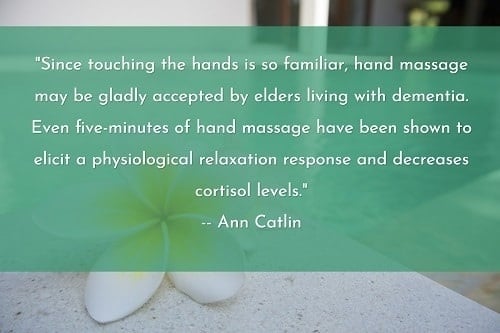
- The power of touch. “Since touching the hands is so familiar, hand massage may be gladly accepted by elders living with dementia. Even five-minutes of hand massage have been shown to elicit a physiological relaxation response and decreases cortisol levels.” — Ann Catlin, The Role of Massage Therapy in Dementia Care, Massage Today; Twitter: @massagetoday
- Go for a walk. “Findings suggest that walking a few times per week might alter the trajectory of the disease and improve the physical well-being of people who develop a common form of age-related memory loss that otherwise has few treatments.” — Gretchen Reynolds, A 1-Hour Walk, 3 Times a Week, Has Benefits for Dementia, The New York Times; Twitter: @nytimes

- Bust a move. “Seniors clubs often include dancing parties in their social calendar. If the person with dementia doesn’t know how to dance, simple dances such as square dancing can be learned and enjoyed, as long as their partner can take the lead.” — Dementia – activities and exercise, Better Health; Twitter: @BetterHealthGov
- Get down with yoga. “In a way, both yoga and meditation are ‘brain exercises’ that engage different parts of the brain based on the components of practice (breathing, movement, postures, chanting, visualization, concentration), and can help the brain form new connections and recover from injuries, or as we call it, to stimulate neuroplasticity.” — Helen Lavretsky as quoted by Jennifer D’Angelo Friedman in The Benefits of Yoga and Meditation for Alzheimer’s and Dementia, Yoga Journal; Twitter: @Yoga_Journal
Music and Art Activities
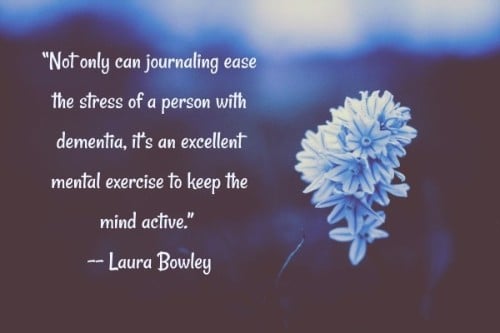
- Keep a journal. “Not only can journaling ease the stress of a person with dementia, it’s an excellent mental exercise to keep the mind active.” — Laura Bowley, The Benefits of Journaling for Caregivers and People with Dementia, Mindset Centre for Living with Dementia
- Take note of the power of music. “Studies have shown music may reduce agitation and improve behavioral issues that are common in the middle-stages of the disease. Even in the late-stages of Alzheimer’s, a person may be able to tap a beat or sing lyrics to a song from childhood. Music provides a way to connect, even after verbal communication has become difficult.” — Art and Music, Alzheimer’s Association; Twitter: @alzassociation
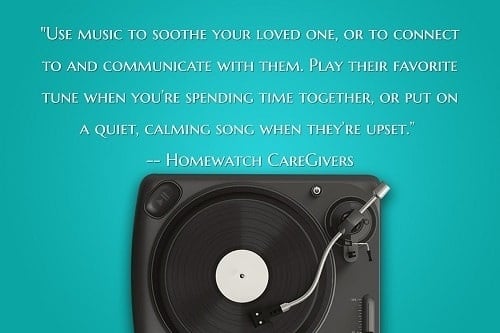
- Play their favorite song. “Use music to soothe your loved one, or to connect to and communicate with them. Play their favorite tune when you’re spending time together, or put on a quiet, calming song when they’re upset.” — The Music Connection and Dementia, Homewatch CareGivers; Twitter: @hwcaregivers
- Get crafty. “These might include simple craft activities, such as creating collages from magazines, or knitting. Someone who has been a skillful knitter may still be able to knit squares for a blanket.” — Finding suitable activities, Alzheimer’s Society of Canada; Twitter: @AlzCanada
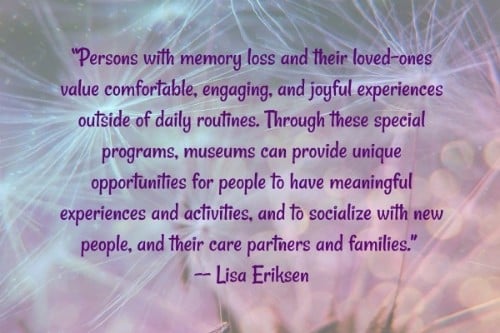
- Visit a museum. “Persons with memory loss and their loved ones value comfortable, engaging, and joyful experiences outside of daily routines. Through these special programs, museums can provide unique opportunities for people to have meaningful experiences and activities, and to socialize with new people, and their care partners and families.” — Lisa Eriksen, Older Adults and Programming for People with Dementia, American Alliance of Museums; Twitter: @AAMers
- Play with PlayDoh. “Making shapes and kneading Play-Doh or modeling clay is a fun and relaxing activity for all ages. Get some fun cookie cutters and play dough and watch your senior have a ball.” — 10 Easy Crafts For Seniors With Dementia: Inexpensive DIY Ideas, Daily Caring; Twitter: @DailyCaring

- Make your own musical instruments. “For this activity all you need is a plastic container with a good fitting lid. Put several dry beans or pasta in the container and you have a music shaker. You can either play some music for them or make one for them to shake with you.” — Easy Crafts For Seniors With Dementia, Senior Living Services; Twitter: @SLS_Communities
- Create a memory box. “Putting together a memory box is a good way of stimulating and drawing out memories. Put favorite objects, old photos, and items from the person’s work in the box to be examined. If the person is agitated, looking at the objects may calm him or her down. During quiet moments, when the person is tired or you don’t want to go out somewhere, looking at the photos and objects can be a very relaxing way of being together.” — Activities: A guide for carers of people with dementia, Alzheimer Scotland; Twitter: @alzscot
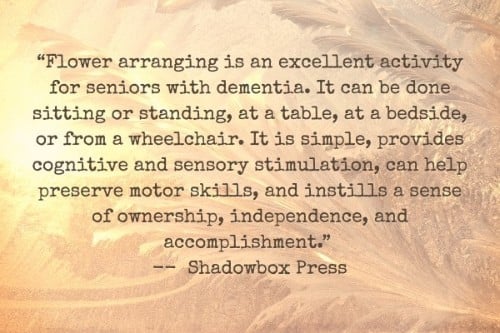
- Make a floral arrangement. “Flower arranging is an excellent activity for seniors with dementia. It can be done sitting or standing, at a table, at a bedside, or from a wheelchair. It is simple, provides cognitive and sensory stimulation, can help preserve motor skills, and instills a sense of ownership, independence, and accomplishment.” — Flower Arranging with Alzheimer’s Patients, Shadowbox Press; Twitter: @ShadowboxPress
- String beads for jewelry. “Stringing beads is a great activity for people in the early and middle stages of memory loss, if you modify the activity appropriately. Those in the early stages will likely be able to string smaller beads (assuming they have the physical dexterity and eyesight to do so) and will likely be able to execute more complex patterns or add clasps or fasteners a great way to make bracelets and necklaces for holiday gifts. Those in the middle stages may need larger beads (such as the wooden ones below or plastic “pony” beads) and may need someone to sit with them to demonstrate the project and perhaps even cue them to pick up the beads, put it on the string, etc.” — String Beads, alzheimersactivitiesPLUS

- Sing a song. “Music is more than just a fun activity that connects people, there is good evidence that it can significantly improve objective measures of health and well-being. Apart from the likely physical benefits of singing as a cardiovascular activity, musical engagement may also reduce levels of the stress hormone cortisol, increase immunity, lower perception of pain and reduce symptoms of depression. Most importantly … music has been shown to improve the mood, memory and overall quality of life in people with dementia.” — Why singing may help people with dementia, The Conversation; Twitter: @ConversationUS
- Read a book. “Research on the effects of brain-stimulating activities back up the memory-boosting benefits of reading. The 2013 study, published in the journal Neurology, found that life-long readers were better protected against Lewy bodies, amyloid burden, and tangles over the 6-year study. Reading into old age also reduced memory decline by more than 30 percent, compared to other forms of mental activity.” — Linda Freund, Reading Improves Memory and Helps Prevent Dementia, Being Patient; Twitter: @being_patient_

- Pick up a paintbrush. “Art improves mood, reduces depression and anxiety, deepens connections with other people. In some cases, art even boosts cognition, claim some caregivers and clinicians who work with people engaged in this form of therapy.” — Jessica Shugart, Art as Therapy—Can Creative Expression Soothe Dementia Symptoms?, Alzforum; Twitter: @alzforum
- Provide ample opportunity for self-expression. “Art projects can create a sense of accomplishment and purpose. They can provide the person with dementia — as well as caregivers — an opportunity for self-expression.” — Art and Music, Alzheimer’s Association; Twitter: @alzassociation
Day-to-Day Routines
- Visit somewhere familiar and pleasant. “Day trips can also bring with them the opportunity for reminiscence and evoking memories. Reminiscing has been proven to have a variety of benefits for those living with dementia as it allows them to recall past experiences and share happy memories, bringing with it a sense of accomplishment and happiness. To encourage reminiscence, visit somewhere familiar to your loved which holds happy memories for them. This could be anywhere from the street they grew up on, a park they used to visit or even a holiday destination which was a family favorite.” — Michelle Cemental, The True Value of a Day Trip for a Senior with Dementia, Caring Senior Service; Twitter: @CaringSrService
- Relate daily activities to their former work life. “A former office worker might enjoy activities that involve organizing, like putting coins in a holder, helping to assemble a mailing or making a to-do list. A former farmer or gardener may take pleasure in working in the yard.” — Activities at Home, Alzheimer’s Association; Twitter: @alzassociation

- Eat and sleep at the same time each day. “Generally speaking, we all function best if we have a regular bedtime, get up at around the same time each day and eat regular meals. So whenever possible try to stick to the same times, it’s a simple way to provide a focus and structure to the day.” — How to create a daily care plan for someone with dementia, Lifted; Twitter: @liftedcare
- Don’t be afraid to talk about the past. “Reminiscing about memories can help people feel more confident in their abilities and provide them with the opportunity to talk about what holds meaning for them. In addition, engaging in conversation about the past can provide relief from boredom and symptoms of depression, and it helps preserve family stories for later generations.” — Benefits of Reminiscence Therapy, Elder Care Alliance; Twitter: @ElderCareAll
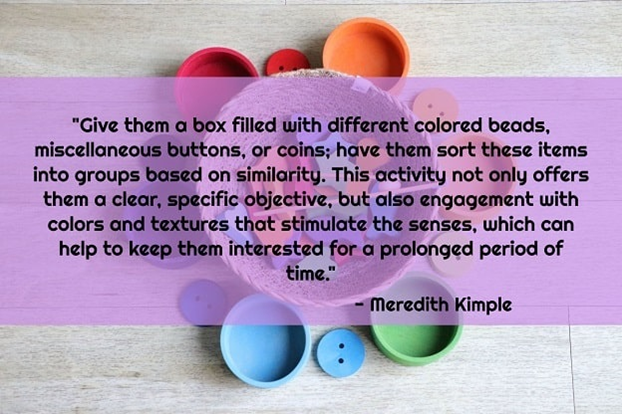
- Sort some items. “One popular activity for those who have dementia or Alzheimer’s disease is the sorting and organization of various objects. Give them a box filled with different colored beads, miscellaneous buttons, or coins; have them sort these items into groups based on similarity. This activity not only offers them a clear, specific objective, but also engagement with colors and textures that stimulate the senses, which can help to keep them interested for a prolonged period of time. You can also have them organize mismatched pairs of socks, or have them help you sort papers and old photos.” — Meredith Kimple, 8 Fun Activities for Alzheimer’s and Dementia Patients, Aegis Home Care; Twitter: @AegisHomeCare
- Explore knitting. “The point is not necessarily for the person with dementia to start knitting again. It is to draw on the person’s interest to engage them in a meaningful way. In a facility, one way to do this is to create a “Knitters’ Circle” of people who were interested in knitting, crocheting, rug hooking and so on. At home it is much easier because you can do it one-on-one. The idea is not necessarily to knit (although they may, as described in the last activity), but rather to talk about the craft, tools and patterns.” — The Box Is Ticked – Knitting For Someone With Dementia, Keeping Busy

- Set up a fish tank. “Placing a large fish tank in the dining area of extended-care facilities significantly increased appetite and weight gain in residents with severe dementia, who are at risk of excessive weight loss, according to a study in the current issue of Alzheimer Disease & Associated Disorders.” — Ann Lukits, To Spur Appetite, Invite Fish for Dinner, The Wall Street Journal; Twitter: @WSJ
- Care for a pet. “Multiple studies have cited benefits such as improved mood and more social interaction — notable benefits since people with dementia are at risk for developing depression, which can further compromise their functioning and quality of life. One such study evaluated animal assisted therapy at an adult day care center for older adults with dementia. The results indicated that involving the people in activities with dogs decreased their feelings of anxiety and sadness and increased physical activity and positive emotions.” — Esther Heerema, How Does Pet Therapy Benefit People With Dementia?, Very Well; Twitter: @Verywell

- Cook or bake something together. “Cooking or baking simple recipes together can be a good way to get them doing something practical whilst also offering a tasty treat as a reward. It’s important to let them do as much as is safe and possible. Depending on their stage it may be the case that they simply watch whilst you cook or they may take the lead and you just help with the steps that they find most challenging.” — 13 Stimulating Dementia Activities To Try With Your Loved One, Super Carers; Twitter: @supercarers
- Indulge in aromatherapy. “Studies have found aromatherapy can help seniors with anxiety and depression issues, as well as encourage a better quality of life. Aromatherapy specifically helps those diagnosed with Alzheimer’s disease relieve agitation and improve sleep. Less unrest means better control over daily processes for the senior, as well as better memory care when they can get a good night sleep.” — Benefits of Aromatherapy on Dementia, Sunrise Senior Living; Twitter: @SunriseSrLiving

- Accommodate favorite activities. “A person who always enjoyed reading the newspaper may still enjoy this activity, even if he or she can no longer completely understand the content.” — Activities at Home, Alzheimer’s Association; Twitter: @alzassociation
- Regularly visit community organizations. “If the person has a connection with an organization within the local community, whether it is a place of worship, a coffee shop or a club, continuing to visit this place might be very important. It may help if a family member or caregiver has some gentle discussions with other attendees to encourage them to continue to welcome the person with dementia, and to minimize any embarrassment.” — Finding suitable activities, Alzheimer’s Society of Canada; Twitter: @AlzCanada

- Talk to God. “According to research, there are some amazing benefits of spiritual care with dementia patients. Studies have shown that cognitive decline is slower for people with higher spirituality and religious practices and a person’s level of spirituality does not decrease in the early stages of dementia.” — Christopher Durfrene, Spiritual care and dementia, Encompass Health; Twitter: @encompasshlth
- Give the person chores to be responsible for. “Things such as sorting clothes, polishing silver and other ‘household’ chores. These activities are easy to set up and present and they don’t take a lot of concentration and energy to complete.” — “Chore” Style Activities for Dementia, Keeping Busy
More insights like this:
-
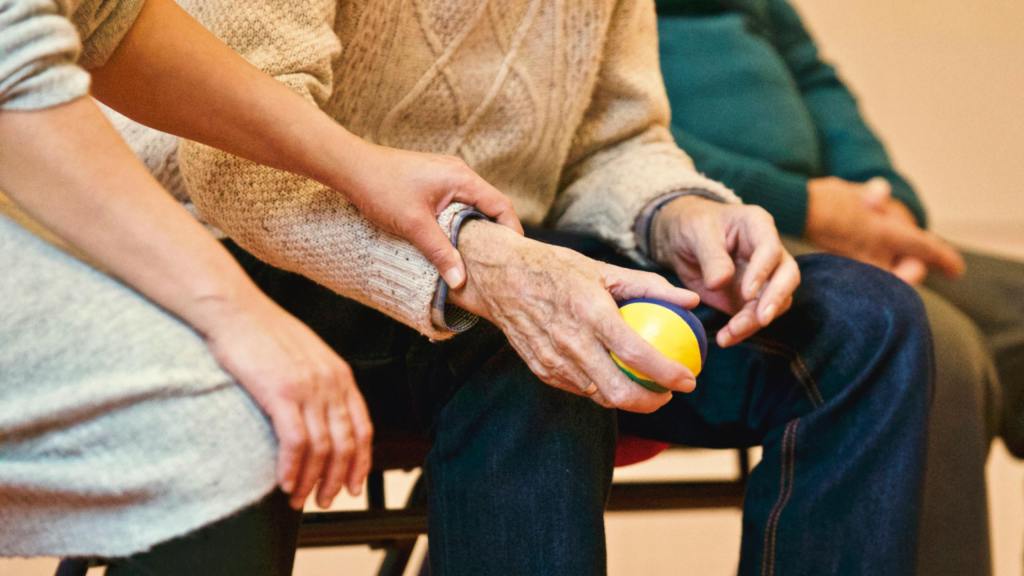
Delirium vs. Dementia: Causes, Symptoms, Treatments, and Preventative Measures
Read more: Delirium vs. Dementia: Causes, Symptoms, Treatments, and Preventative MeasuresFeelings of confusion, difficulty focusing, and memory loss can have many causes and, especially in older adults, can be hard to tell apart from more typical signs of aging. Delirium is a disturbance in mental abilities, resulting in confused thinking and reduced awareness of one’s environment. Symptoms of delirium typically come on quickly,…
-

What Caregivers Should Know About Early-Onset Alzheimer’s
Read more: What Caregivers Should Know About Early-Onset Alzheimer’sSymptoms, Stigma, Diagnosis, and Treatment Early-onset Alzheimer’s disease, also known as younger-onset, is the development of Alzheimer’s symptoms between the ages of 30 and 65. A diagnosis is relatively rare at a younger age, and while over 6 million people in the United States are living with Alzheimer’s disease, the true prevalence of early-onset is uncertain.…
-

15 Tips on Transitioning a Loved One to Memory, Dementia, or Alzheimer’s Care
Read more: 15 Tips on Transitioning a Loved One to Memory, Dementia, or Alzheimer’s CareAs a part of your journey caring for someone with Alzheimer’s or another form of dementia, there may come a time when the effects of the disease become too much for a caregiver to handle, and one must seek alternative care options. When deciding the right time to transition your loved one to…
